







Last month I asked board members and superintendents to advocate for special education. I would continue to ask that you do so going forward. The Select Committee on Special Education has held listening sessions around the state and has begun to work on the bill language. Your advocacy will continue to inform them as you tell them of the effect the decrease in excess cost sharing funds that has rearranged the priorities in the budgets you are now developing for next fiscal year. And let’s add to the mix this month the potential loss of federal grants and what that will do to staffing, programs and students. The throughthread here is for you to inform and educate your legislators — if they don’t know how these issues effect your district they cannot advocate on your behalf.

Lisa Steimer Deputy Executive Director, CABE
Thank you, Board of Education members!
The month of March is Connecticut Board of Education Member Appreciation month. This is the perfect opportunity to say “thank you” to the hard-working and dedicated board members across Connecticut. We encourage you to recognize the time and effort they devote to board business during the course of the year. Use #BoardAppreciationMonth and #THANKYOU when thanking your Board members on social media.
CABE will be sharing Board of Education Appreciation videos during March. We encourage you to share these at a Board of Education meeting in March.
The Connecticut Board of Edu-
cation Member Appreciation online toolkit includes facts about Connecticut’s Board of Education members and quotes you can use in recognizing Board members. You can also access customizable materials such as editorials, new releases, suggestions for saluting school board members, and more in the Members Only section of the CABE website - https://www. cabe.org/members/board-of-ed-appreciation-toolkit. You may also purchase Thank You Hershey bars, “Out of the public schools grows the greatness of a nation” note pads, and Thank You tumblers at https://www.cabe.org/page. cfm?p=1281
On behalf of all of us at CABE, we thank Connecticut’s Board of Education members for the dedication they show not only to each child in their districts, but also to each child in Connecticut! You are making a difference!
Please contact Lisa Steimer (lsteimer@cabe.org) if you have any questions about the Board of Education Appreciation Month program.
CABE was recognized by the National School Boards Association (NSBA) with the Leading Edge Award at the recent NSBA Advocacy and Equity Institute.
Established in 2018, NSBA’s Leading Edge Award recognizes state school board associations for developing innovative projects that promote and advance public education.
CABE was recognized for its partnership with the CT State Department of Education to deliver a robust professional development program, Ready. Set. Govern!.
The Ready. Set. Govern! professional development program reflects the strong partnership between CABE and the State Department of Education.
Through a contract with the CT State Board of Education, CABE provided training for newly elected members of local and regional boards of education required by state legislation effective July 1, 2023. Under this contract, CABE enhanced its robust professional development program and had the opportunity to make the resources available to all board of education members at no charge.
The programs delivered under the contract included:
• Two New Board Member/Leadership Conferences were held in August and December 2024.
Connecticut’s educational system is a cornerstone of its social and economic well-being, yet the challenges surrounding equitable funding for public schools persist. As the Connecticut General Assembly (CGA) prepares for its upcoming legislative session, one of the most pressing issues requiring attention is the reevaluation of the Education Cost Sharing (ECS) formula and special education funding. The ECS formula, designed to allocate state aid to public school districts, and the mechanisms for supporting special education services directly impact the quality of education received by thousands of students across the state. Without reform, disparities in funding threaten to perpetuate inequities in educational outcomes, particularly for students with disabilities and those from underserved communities.
The ECS formula was created to ensure that state resources are distributed equitably among Connecticut’s school districts. It considers factors such as a district’s student population, property tax base, and income levels. While well-intentioned, the formula has been criticized for being outdated and insufficiently responsive to the evolving needs of districts. Wealthier towns with high property values often have the resources to fund their schools at higher levels, whereas poorer districts rely heavily on state aid to meet their educational needs. As a result, the existing formula has contributed to a persistent gap in per-pupil spending between affluent and economically disadvantaged communities.
A 2021 study by the School and State Finance Project highlighted that underfunded districts often struggle to provide adequate resources, including up-to-date technology, experienced teachers, and modern facilities. These disparities are particularly harmful to students in low-income areas, who are already at greater risk of falling behind academically. By reevaluating and modernizing the ECS formula, the CGA could address these inequities and ensure that all Connecticut students have access to a high-quality education, regardless of their zip code. The need for comprehensive
reform is especially urgent around special education funding. Providing individualized education programs (IEPs) and other mandated services for students with disabilities requires significant financial resources, often placing a substantial strain on district budgets. According to the Connecticut School Finance Project, special education costs have risen steadily in recent years, largely due to increased identification rates and the growing complexity of students’ needs.
Currently, the state’s special education funding model relies on a mix of federal, state, and local contributions. However, these funds are often insufficient to cover the true cost of services, forcing districts to divert resources from general education programs to meet their legal obligations. This funding shortfall disproportionately impacts smaller districts and those with higher concentrations of students requiring special education services. For example, a rural district with limited tax revenue may struggle to fund specialized staff, assistive technology, and transportation, leading to inequities in the quality of services provided. By reevaluating the funding mechanisms for special education, the CGA can ensure that districts are better equipped to meet the needs of all students. This may involve increasing state contributions, revising reimbursement thresholds, or exploring alternative funding models that more accurately reflect the true costs of special education. I applaud the Legislature for creating the Select Committee on Special Education to address the topic.
Reforming ECS and special education funding is not just a matter of fairness — it is an investment in Connecticut’s future. Research consistently shows that educational inequities contribute to broader social and economic disparities. Students who lack access to quality education are less likely to graduate from high school, pursue higher education, or secure stable employment. This, in turn, perpetuates cycles of poverty and reduces the state’s overall economic productivity.
Connecticut’s achievement gap, one of the largest in the nation, underscores the urgent need for systemic change. For example, standardized test scores reveal significant disparities
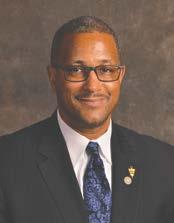
between students from high-income and low-income families, as well as between students with and without disabilities. Addressing these gaps requires targeted investments in underfunded districts and specialized services. By doing so, the state can ensure that all students, regardless of their background, can succeed academically and contribute to the workforce. Moreover, equitable education funding is essential for attracting businesses and fostering economic growth. Companies looking to relocate or expand often consider the quality of local schools as a key factor in their decision-making process. By demonstrating a commitment to educational equity, Connecticut can position itself as a competitive and inclusive state, capable of meeting the needs of both its residents and its economy.
As the CGA reevaluates ECS and special education funding, several policy recommendations should guide their efforts:
• Modernize the ECS Formula: The formula should be updated to account for current economic and demographic trends. This includes adjusting for rising costs, incorporating more accurate measures of student need, and addressing regional disparities in funding.
• Increase State Funding for Special Education: The state should increase its share of special education funding to alleviate the burden on local districts. This may involve raising the reimbursement rate for high-cost cases or creating a dedicated fund to support students with complex needs.
• Implement Accountability Measures: Any changes to funding should be accompanied by robust accountability measures to ensure that resources are used
Mission:
Vision:
EXECUTIVE COMMITTEE
Leonard Lockhart | President, Windsor
Meg Scata | First Vice President, Portland
Lon Seidman | Vice President for Government Relations, Essex
Eileen Baker | Vice President for Professional Development, Old Saybrook
Anthony Perugini | Secretary/Treasurer, Cheshire
Elizabeth Brown | Immediate Past President, Waterbury
Lydia Tedone | NSBA Director, Simsbury
Ethel Grant | Member at Large, Naugatuck
AREA DIRECTORS
Marion Manzo | Area 1 Co-Director, Region 15
Thomas van Stone | Area 1 Co-Director, Waterbury
Jennifer Hockenhull | Area 2 Co-Director, Hartford
Lisa Simone | Area 2 Co-Director, Bloomfield
Julia Dennis | Area 2 Co-Director, Berlin
Karen Colt | Area 3 Co-Director, Vernon
Sara Kelley | Area 3 Co-Director, Stafford
Chris Stewart | Area 4 Co-Director, Putnam
Ailla Wasstrom-Evans | Area 4 Co-Director, Brooklyn
Chris Gilson | Area 5 Co-Director, Newtown Tina Malhotra | Area 5 Co-Director, Ridgefield
Goldstein | Area 6 Co-Director, Westport
McCammon | Area 6 Co-Director, Darien
Hatfield | Area 7 Co-Director, Seymour
Mongillo | Area 7 Co-Director, Derby
Edward Strumello | Area 7 Co-Director, Seymour Lindsay Dahlheimer | Area 8 Co-Director, Region 13
Seth Klaskin | Area 8 Co-Director, Madison
Kim Walker | Area 8 Co-Director, Westbrook
ASSOCIATES
Jaime Barr Shelburn | Associate, East Lyme
Ethel Grant | Associate, Naugatuck
Tyrrell | Associate, Plainville
COMMITTEE CHAIRS
Lee Goldstein | Chair, Federal Relations, Westport
Steinhauser | Chair, Resolutions, Portland Lindsay Dahlheimer | Chair, State Relations, Region 13
CITY REPRESENTATIVES
Jennifer Perez | City Representative, Bridgeport
Deristel-Leger | City Representative, Hartford
Rivera | City Representative, New Haven
Koc | City Representative, Stamford
Ireland | City Representative, Waterbury
VALEDICTORIAN
Connecticut Business Systems –
A Xerox Company
Finalsite
SALUTATORIAN
Berchem Moses PC
Pullman & Comley
Shipman & Goodwin
HONOR ROLL
JCJ Architecture
Kainen, Escalera & McHale, P.C.
Newman/DLR Group
Solect Energy
SCHOLAR
Blue Line Solutions
Brown & Brown
Chinni & Associates, LLC
Coordinated Transportation Solutions Dattco, Inc.
ESS
Franklin Covey
GWWO Architects
The Lexington Group
Perkins Eastman
The S/L/A/M Collaborative Zangari Cohn Cuthbertson
Duhl & Grello, P.C.
Above Line Solutions
American School for the Deaf Area Cooperative Educational Services (ACES)
Booker T. Washington Academy
Cambridge International
Capitol Region Education Council (CREC)
Connecticut Alliance of YMCAs
Connecticut Arts
Administrators Association
Connecticut Association for Adult and Continuing Education (CAACE)
Connecticut Association of School Business Officials (CASBO)
Connecticut School Buildings and Grounds Association (CSBGA)
Connecticut Technical High Schools
Cooperative Educational Services (C.E.S.)
EASTCONN
EdAdvance
EDC Solutions
Explorations Charter School
Great Oaks Charter School
Integrated Day Charter School
ISAAC
LEARN
New England Science & Sailing Foundation
Odyssey Community School, Inc.
The Bridge Academy
Executive Director & General Counsel, CABE
This month we celebrate the extraordinary contributions of Connecticut’s 1400 volunteer school board members during “School Board Appreciation Month”. I know board members have faced significant challenges as they address the learning gaps and social emotional needs exacerbated by the pandemic, as well as ongoing fiscal challenges. I also know there have been many successes to celebrate – new school building projects or renovations to create state of the art learning spaces, reengagement of students in their learning, and expanded career and technical education opportunities to name a few.
Our many exemplary board members prepare thoughtfully for meetings, engage with their community, and demonstrate civility and respect. Boards of education
that develop a shared vision with their superintendent and work as a collaborative team are in the best position to support student success. When board members understand and respect their role and that of the superintendent, they can focus their energies on the board and district goals.
Effective board members support the board chair in holding their colleagues accountable for maintaining decorum and civility. Boards of education can offer a reprieve from the social media and news streams that often fly in the face of civility. Effective boards keep discussions focused on the issues, not the individual commenting on the issue – whether that be a fellow board member, administrator or staff members. Petty insults and degrading comments have no place at the board table or on social media.
Over the past year board members
Patrice McCarthy
Executive Director & General Counsel, CABE
The Social Security Fairness Act, passed by Congress and signed by President Biden in January enables retired public school educators in the 15 states where school districts don’t participate in Social Security to receive full federal retirement benefits for any income they earned from jobs for which they paid into the Social Security system. In other words, they can now collect federal
PRESIDENT (continued from page 2)
effectively and equitably. This may include requiring districts to report on how funds are allocated and their impact on student outcomes.
• Promote Collaboration: The state can encourage districts to pool resources and share services, particularly in rural areas, to reduce costs and improve

have expressed appreciation for the professional development and networking opportunities provided by CABE. They have seen the value in learning about best practices from their colleagues around the state, building their understanding of the budget process, and sharpening their leadership skills. We look forward to continuing to work together with you to support effective, collaborative governance in every Connecticut school district. On behalf of the CABE staff, I congratulate our volunteer school board members and express our sincere appreciation for their dedication to Connecticut’s students.
retirement benefits if they spent portions of their career in the private sector or as educators in other states. Educators in Alaska, California, Colorado, Connecticut, Georgia, Illinois, Kentucky, Louisiana, Maine, Massachusetts, Missouri, Nevada, Ohio, Rhode Island, and Texas are affected. CABE supported this legislation, which can help attract individuals to the teaching profession, particularly those changing careers.
efficiency. Regional special education cooperatives, for example, could help districts provide high-quality services at a lower cost.
The Connecticut General Assembly has a critical opportunity to address longstanding inequities in public education funding during its upcoming session. By reevaluating the ECS formula and special education funding, lawmakers can ensure that all students, regardless of their
The National School Boards Association National Nominating Committee, chaired by NSBA Immediate Past President Kristi Swett (UT), met on January 31, 2025, and selected Leonard Lockhart (CT) and Becky Fles (ME) as candidates for the positions of NSBA President-elect and Secretary/Treasurer, respectively. Congratulations to both! The election will take place during the NSBA Annual Conference in April.
background or abilities, have access to the resources they need to thrive. This is not only a moral imperative but also an economic necessity, as a well-educated population is essential for the state’s long-term prosperity. Through thoughtful reform and targeted investments, Connecticut can take a significant step toward creating a more equitable and effective education system for all.
Thomas B. Mooney, Esq. Shipman & Goodwin
The Nutmeg Board of Education makes many mistakes. The latest imbroglio created by the board will be reported here each issue, followed by an explanation of what the board should have done. Though not intended as legal advice, these situations may help board members avoid common problems.
In finalizing the Board’s budget request for 2025-2026, the members of the Nutmeg Board of Education have been making tough decisions to trim their budget request down to a five percent increase for next year. Their frustration has been exacerbated by conflicting pressures. Unions who stand to lose positions next year have been protesting, while Seymour Dollars, the veteran Chairperson of the Nutmeg Board of Finance, has been insisting on social media that the Board request better not exceed a three percent increase for next year. In short, the Nutmeg Board has been put in a no-win situation.
At the Board meeting last night, things got worse. Nellie Negative, a frequent complainer, took the Board to task during Public Comment. Nellie started a three-minute diatribe against the Board with “You guys are derelict! I hear that the Board cares about the safety of its students and staff. But you haven’t done a thing about indoor air quality. You cry poor and neglect building maintenance. God only knows what is going on in our schools!”
Veteran Board member Bob Bombast snapped. “You don’t know what you are talking about, Nellie. I am sure that Mr. Superintendent has everything under control!”
“You are wrong as usual, Bob!” responded Nellie. “I have been scouring the Board agendas and district websites, and there is no evidence that the district has done any of the inspections of the HVAC systems in the schools as required by state law.”
“Oh, you mean another unfunded mandate?” retorted Bob. “I am sure that we will get to it when we have the time and money. We have to set some priorities, and first we must pay our bills with the limited funds we have. If you really care about this HVAC thing, you should talk to the Board of Finance about giving us the necessary
funds.”
Mr. Superintendent weighed in. “We do our best, but we just haven’t had the money. Moreover, I am in the schools all the time, and the air seems fine to me. Nellie, I am sick of people like you sowing fear without any good cause.”
“Don’t you guys read the laws?” Nellie persisted. “School boards are required to inspect the HVAC systems of each of their schools and post the results of such inspections on the district website and the websites of the individual schools. But when I go to the website of Median Middle School, I read about bake sales, but I don’t see a thing about the required HVAC inspection.”
“Oh, now I get it!” said Mr. Superintendent. “Nellie, maybe you should read the law more carefully. I did, and I am happy to inform you and the Board that the requirement for HVAC inspections doesn’t begin to apply until next year. We have a tough budget this year, but we will try to put some funding into the budget for 2026-2027 for these inspections.”
“Look . . . ,” Nellie began to respond, but Mr. Chairperson cut her off, citing the Board’s rule that public comment for any individual is limited to three minutes and noting that Nellie’s time had long expired.
Is Nellie just worrying about nothing, and is Mr. Superintendent correct in noting that the requirement for HVAC inspections doesn’t start until next year?
Mr. Superintendent was correct in stating that the new HVAC inspection mandate is first effective July 1, 2026. However, under current law, school districts must conduct inspections of the indoor air quality of each school every year, and at the least the Nutmeg Board of Education was derelict in not posting the results of those indoor air quality inspections on the district website and that of each individual school (if indeed these inspections occurred).
Specifically, as amended last year Conn. Gen. Stat. § 10-220(d) imposes two separate inspection requirements: annual inspection of and report on the indoor air quality of each school, and periodic inspection of and report on the HVAC system of each school.
Section 10-220(d)(2) now provides: “On and after January 1, 2024, and annually thereafter, a local or
regional board of education shall provide for a uniform inspection and evaluation program of the indoor air quality within each school building using the Environmental Protection Agency’s Indoor Air Quality Tools for Schools Program.” The statute details the various components of such indoor air quality evaluations, which include “review, inspection or evaluation” of HVAC systems, the presence of radon, fungi, mold and bacteria, hazardous substances, chemical compounds in the air, as well as the degree of pest infestation and use of pesticides, a review of water incursion, plumbing, building elements, “the provision of indoor air quality maintenance training for building staff” and even an assessment of the overall cleanliness of the buildings.
Significantly, this required annual review of indoor air quality in schools does not require testing, and school districts should carefully consider whether and when to test for indoor air quality. However, the statute does require that boards of education must
“make available for public inspection the results of the inspection and evaluation at a regularly scheduled board of education meeting and on the Internet web site of such board and on the Internet web site, if any, of each individual school.” If Nellie was correct that the results were not so posted (if indeed the district conducted the required review of air quality at all of its schools), the Nutmeg Board was derelict in not complying with this statutory requirement.
Conn. Gen. Stat. § 10-220(d)(3) sets out a separate obligation. Starting July 1, 2026, each school district must undertake a “uniform inspection and evaluation of the heating, ventilation and air conditioning system within each school building under its jurisdiction.” At least twenty percent of the buildings in the district must be inspected each year so that all the district buildings are inspected by 2031, at which point the cycle resets such that each school has its HVAC
See SEE YOU IN COURT page 9

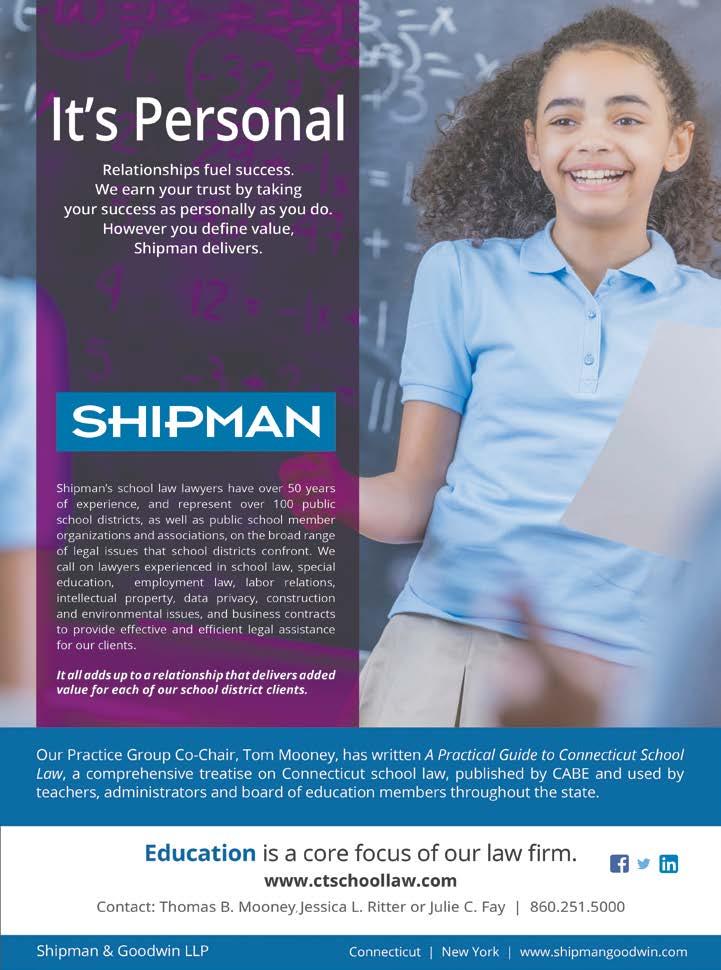
Legal
Below are the highlights of activities that the CABE staff has undertaken on your behalf over the last month. We did this:
By providing opportunities for members to learn how to better govern their districts:
z Provided Roles and Responsibilities workshops for the Putnam and Region #19 Boards of Education.
z Participated in planning sessions for upcoming board retreats with the Bridgeport and Stamford Boards of Education.
z Facilitated a board retreat for the Chester Board of Education.
z Responded to 29 requests for policy information from 34 districts, providing sample materials on policy topics. Further, districts continue to access CABE’s Online Core Policy Reference Manual and/or online manuals posted by CABE for policy samples. The topics of greatest interest were those pertaining to Ages of Attendance/Attendance and School Climate.
z Provided support to board members and central office administrators regarding policy matters.
By ensuring members receive the most up-to-date communications:
z Provided a breaking news update,
via e-mail, with information regarding U.S. Immigration and Customs Enforcement (ICE) Enforcement Protocols.
By promoting public education:
z Provided press briefing on CABE issues in 2025 legislative session.
z Attended CABE Areas 4, 5, and 9 legislative breakfasts.
By providing services to meet member needs:
z Presented CABE Leadership Award to the Canton Board of Education.
z Facilitated monthly board chair check-in.
z Responded to a variety of legal inquiries from members.
z Provided a workshop on School Governance Councils for Hartford Public Schools.
z Participated in a board retreat with the Region #17 Board of Education.
z Facilitated a discussion for an upcoming Superintendent Search.
z Facilitated a board self-evaluation for the Bridgeport Board of Education.
z Working with the State Board of Education and the Digital Learning Advisory Council on developing AI Best Practices in Schools.
z Participating on a planning committee organized by the CSDE’s Math and Computer Science Consultant in bringing a screening of the movie Counting Out to Connecticut.
z Working with a district to develop a school decommissioning process.
z Prepared materials, as part of the Custom Update Policy Service, for East Hampton, Marlborough, New Fairfield, New Hartford, and Sterling
z Prepared materials, as part of the Custom Policy Service, for the Region #15, Shelton, and Woodbridge Public Schools.
z Preparing a Policy Audit for the Bristol, Killingly, and Scotland Public Schools.
z Assisting the Region #13, Region #20, Stratford, Voluntown, and Windham Boards of Education with
their superintendent searches.
z Provided webinar on Social Studies curriculum.
z Provided webinar on the impact of the Governor’s budget on school districts.
z Staffed CABE/CAPSS Convention Committee meeting.
z Staffed CABE DEI Committee meeting.
By helping districts operate efficiently and conserve resources:
z Posted policies online, as part of the C.O.P.S. Program for, Bolton, Cheshire, Granby, Griswold, New Fairfield, New Hartford, Region #16, Ridgefield, Somers, Westport, Voluntown, Wolcott, and CABE CORE Manual.
By attending Professional Development to strengthen staff knowledge and skills:
z Attended state association executive directors meeting.
By representing Connecticut school boards on the state or national level:
z Attended NSBA Leadership and Equity/Advocacy Conferences.
z Met with CT Congressional delegation and staff.
z Chaired High School Graduation Requirements meeting.
z Met with legislative leaders to discuss CABE priorities.
z Attended CT Educator Preparation and Certification Board meeting.
z Discussed NAEP results with NBCCT.
z Participated in WhatWillOurChildrenLoseCoalition meeting.
z Attended Special Education Task Force meeting.
z Attended CREC Council meeting.
z Provided overview of 2025 legislative session for the Mount Holyoke Club of Hartford
z Met with Department of Administrative Services to discuss legislative priorities.
z Attended Special State Board of Education meeting.
z Participated in Increasing Educator Diversity Policy Council meeting.
z Discussed school start times with CT Insider reporter.
z Attended CAS Board meeting.
z Digital Learning Advisory Council for the Connecticut Commission for Educational Technology
z Attended a Discovering Amistad Board of Directors meeting.
SEE YOU IN COURT (continued from page 4)
assessed every five years.
District personnel may not conduct such HVAC evaluations. Rather, the HVAC inspections must be conducted by outside experts who meet specific qualifications set out in the statute. The statute provides for an extension of the deadline for such inspections if there is an insufficient number of qualified persons to conduct such inspections, but such extension may not exceed one year. Advanced planning and budgeting will be essential.
The amended statute specifies in more detail the requirements of such HVAC inspections, which must result in the production of a report that includes a description of any necessary corrective action(s). Any corrective actions must be performed by contractors who meet the qualifications specified in the statute. Moreover, as with indoor air quality evaluations, the HVAC report must also be made available to the public as described above. In summary, the statute imposes significant new obligations on school districts that should be addressed in a timely manner with appropriate professional assistance.
Finally, in getting into it with Nellie, Bob violated a cardinal rule of public comment: Listen, but do not respond, because board members may not have all the information.
Attorney Thomas B. Mooney is a partner in the Hartford law firm of Shipman & Goodwin who works frequently with boards of education. Mooney is a regular contributor to the CABE Journal. Shipman & Goodwin is a CABE Business Affiliate.
Understanding the nuances of our state Freedom of Information Act can take a long time. But even once a person becomes knowledgeable about the myriad requirements and exceptions, a person hoping to be ultimately successful with a FOI complaint could run into a barrier other than substantive law, one that is more procedural in nature.
Legal “standing” is a concept under the law that requires that the person filing a complaint must have actually been affected by the underlying issue/event that is being complained about. Many times, a court or state agency engaging in a standing analysis is straightforward. But when there are arguments about standing, it can get a bit confusing.
As with most areas of the law, there is an assortment of nuances and exceptions and multi-part “tests” for courts to run through to determine whether the person filing a complaint
indeed has standing. And determining whether a person or entity is “affected” by an issue/event is an oversimplification of standing as there are different types, but it is helpful as a general definition. While this article focuses on the FOI Commission, standing applies across all manner of complaints filed with various courts and agencies.
A recent FOI Commission decision from January illustrates how even if a person may be right about the rules of the FOI Act, that person may still be unsuccessful if they lack standing.
Although the case does not involve a board of education (the FOI Act applies to all state agencies) it does involve an issue relevant to board of education meetings: the ability to enter into executive session to discuss the “appointment, employment, performance, evaluation, health or dismissal of a public officer or employee” (see CGS Section 1-200(6)).
More specifically, the complaint revolved around the requirement that the individual to be discussed in an
executive session has the ability to instead request any such discussion be held in open session. And prior notification to the individual is necessary.
In the case, a town library commission was conducting the process of hiring the director of a library, and a complaint was filed arguing that a candidate being discussed in executive session was not given prior notification.
Unfortunately for the person filing the complaint, she was not the candidate being discussed, which ended the proceedings with a lack of standing.
As the Commission stated: “the right to prior notification and the right to request that an executive session discussion . . . be conducted as part of an open meeting is the right of the individual who is slated for discussion during executive session.” The Commission continued: “[c]onsequently, it is concluded that the complainant does not have standing to file a complaint alleging a violation of another individual’s rights under the FOI Act.”
A brief note on the title on this
article, but relevant at this point. Standing is generally seen as a threshold issue for a court, so if there is a determination that there is a lack of standing, courts usually do not then analyze the alleged violation/issue for validity. So, a more appropriate title for the article would be along the lines of “this court will not say whether you are right or not about the underlying issue because you do not have standing” but that is not as catchy.
And that is what happened in the Commission decision here, where it declined to ultimately determine whether the candidate was properly notified as the complainant was deemed to lack standing.
To pivot to another FOI Commission decision from the same month, one that does not turn on standing but one that is perhaps the inverse of the above situation. The person bringing the complaint was perhaps the exact right person, but the law was just not on his side. It involves a school district
See GOOD POINT page 10

Nicholas D. Caruso,
Associate Executive Director for Field Service and technology, CABE
I spend a lot of time on the road, visiting school boards across the state, and have noticed that the roads in Connecticut don’t always make sense. Many of our roads started out as Indian trails or game trails – following the original topography of the land. Time and “modernization” have eliminated much of that topography so many of our roads no longer make sense to anyone but residents.
Knowing exactly where I need to arrive, and at the appropriate time is important, especially once Daylight Savings Time kicks in; I’ve floundered about in the dark on more than one occasion looking for a board meeting.
I’ve grown very dependent on GPS devices – so much so that I can’t remember the last time I looked at a map. With GPS linked through my phone, I plug in the address and the GPS tells me where to go.
It occurred to me that this is an interesting model for leadership for school boards. Boards should focus on
the destination, and let the professional staff help you get there in the best possible way. The board should focus on the destination, not the actual route.
A Superintendent and school staff will focus on the street-by-street directions, plotting out the trip, developing a list of resources necessary to complete the journey. Their research will point out the landmarks and the hazards to avoid, and when one appears, they will have the insight to work around it.
In order for this to work, the board must be clear in its expectations. The board (with help from the Superintendent and perhaps the administrative team) should adopt district goals. Based on these goals, The Superintendent should develop his/her goals and expect the district staff to also have goals related to the district vision. The Superintendent (with help from staff) should then develop action plans and report back to the board the “road map”, which should:
• Show the objectives (destination)
• Give the board options on the type of route you will travel together (but the Superintendent
should make sure the board knows if they have a particular one in mind - and why).
• Identify the “Construction delays” and let the board know about the detours.
• Let the board know how much it will cost to get there and how long it will will take.
• Develop measurable outcomes and how you will all know when you’ve arrived at your destination. The Superintendent should tell the board where the landmarks will be, and let them know when you arrive at them.
For example, let’s say that the board has agreed that early literacy is a major priority of the school district. Through goals, or board policy the board should identify the desire to see an improvement in literacy. The board should be aware of the district goals at all times. I strongly recommend that district goals be printed on every agenda with a focus on the district goals as a part of the Superintendent’s Report at EVERY meeting. While there are numerous decisions the board must make; the board should
try to focus their attention on the destination. When board meetings are focused on the mundane – everyone at the table should ask his or herself if a policy can be written that will give insight and direction to a particular issue, so that the superintendent or other administrators can start to make those decisions, rather than losing sight of the real destination.
The metaphor is not totally relevant – superintendents are not computer programs. They are bright, visionary people who need to assist the board in setting vision and direction. Boards need to lean on their expertise to help determine where best to go. However, the board should make sure the tank is full (of gas or fully charged), start the engine and put the bus in gear. Then they should depend on the superintendent and staff to get them to their destination.
If your district would like assistance in developing a district vision, goal setting or other facilitation assistance, contact Nick Caruso, Associate Executive Director for Field Services and Technology at CABE (ncaruso@ cabe.org).
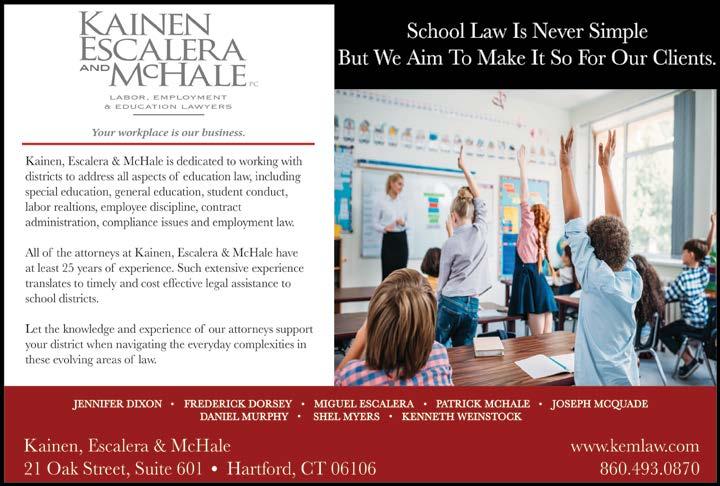
Jody Goeler Sr. Staff Associate for Policy Service, CABE
In a world of changeability and uncertainty, the only certainty is we’re likely to be confronted with many more changes (or proposals for change) and greater uncertainty in the foreseeable future.
Artificial intelligence is one of those areas that will continue to cause changes in the educational landscape. In an Education Week article, Schools’ AI Policies Are Still Not Clear to Teachers and Students, Lauraine Langreo, citing an EdWeek Research Center summary, reports, “A majority of educators say their districts have not made their artificial-intelligence policies clear to educators and students.” (Education Week, January 30, 2025) Those 990 surveyed teachers reported that AI policies also needed to be more explicit for students.
Still, the lack of clarity or the absence of district AI-use policies is one of the top reasons many educators have yet to embrace and experiment with the emerging technology. According to educators who remain unsure of what is acceptable, this has also led to confusion among teachers on how to address student misuse of AI tools. Policies, such as CABE’s model policy on Artificial Intelligence (6141.3273), which balances ethical considerations and academic integrity with innovative practices, can perhaps quell the fear of missteps, which may provide an obstacle to necessary progress in this critical area.
In response to what teachers are continuing to share as concerns regarding implementing AI practices in their classrooms, it is essential that districts and schools provide thorough guidance and professional development on AI for educators and students. Look for experts on your staff — those who may not have formal positions related to technology but are very familiar and comfortable with various tools and their applications. For additional assistance, look to your regional education service providers, such as EdAdvance, for technical and transformational support. As with all technologies, districts need to address the technical aspects of the
technologies (How do we use it? What can it do?) with the transformative opportunities they provide (How can I use this technology in new ways to advance critical thinking and cognitive engagement?).
While technological advancements continue to require our attention, recently, our focus has been drawn to the political world. With the flurry of executive orders signed by President Trump since he took office on January 20 and recent court actions, districts must attend to a broad range of policy considerations - some immediately and others to monitor and wait for additional guidance.
With the January 9 District Court decision to vacate the 2024 Title IX Final Rule and Regulations that took effect in August, the U.S. Department of Education has withdrawn them completely. As a result, school districts are now required to reinstate and follow their 2020 Title IX-compliant policies. This requires boards of education to rescind their 2024 policies and reinstate those required in 2020.
Melinda Kaufman, a school attorney with Pullman & Comley, highlights several important questions for districts to keep in mind when transitioning back to the 2020 requirements:
• Does the district have the correct configuration of individuals, such as Title IX Coordinator, Investigator, Decision-Maker and Appeal Decision-Maker?
• Are district staff trained on the 2020 regulations? Do they need a refresher if they were operating under the 2024 regulations? (Remember that there are likely newer staff members who hadn’t been trained in the 2020 “Final Rule.”)
• Has the district put its Title IX training materials back on its website if they had been removed? Making matters more complicated, in a February 4, 2025 memo, the Department of Education’s Office of Civil Rights (OCR) directed that “open Title IX investigations initiated under the 2024 Title IX Rule should be immediately reevaluated to ensure consistency with the requirements of the 2020 Title IX Rule…” According to Attorney Kaufman, it remains a legal
query as to what districts must do if it has already completed a Title IX investigation under the 2024 Title IX Rule. District leaders should work collaboratively with their board’s legal counsel to ensure coherent and defensible strategies in making this transition, as there will likely be many legal questions that arise. (Title IX on the Nines, February 10, 2025)
In its February 7 issue of School Law: Emerging School Law Issues, Shipman & Goodwin attorneys Dori Pagé Antonetti and Joseph Miller outline what President Trump’s executive order entitled “Ending Radical Indoctrination in K-12 Schooling” means for schools. Unlike what districts need to do to comply with Title IX, this executive order does not require immediate action. Antonetti and Miller point out, “the order tasks various executive branch officials with developing recommendations for the President’s consideration.” The attorneys add, “We recognize, however, that this and other recently issued executive orders have created significant tension-and, in some areas, even conflict--between federal directives and state law.”
Perhaps having future policy implications, this executive order targets “subversive” and “anti-American” thinking and aims to eliminate federal funding for “illegal and discriminatory treatment and indoctrination in K-12 schools, including based on gender ideology and discriminatory equity ideology.” It defines “discriminatory equity ideology” as instruction that would, among other things, label members of any race or gender as inherently racist or oppressive. It also contends that discussing ideas such as white privilege and unconscious bias could promote discrimination and undermine “national unity.”
The guidance, which is to be developed by the Education, Health and Human Services, Defense and Justice Departments, will likely have a lot to say about how schools need to comply with the intent of the executive order to remain eligible to receive federal funding. Schools will need to contend with reconciling this and similar guidance with pursuing their mission of educating all students to
participate and thrive in a pluralistic society and engage in a complex and dynamic world. Outside of the legal considerations, districts will need to somehow consider policy language that incorporates what they aspire for all students, with guidance stemming from executive orders that use such language as “patriotic education” and “discriminatory equity ideology.”
These topics referenced do not provide anything near a comprehensive list of actions taken by the executive branch through the early days of February. By the time the March CABE Journal is published, there will likely be many more potentially impacting board policies and district practice. It will be necessary for superintendents and boards of education to remain alert, communicate, and consult with legal counsel and CABE to ensure we continue to advocate for public schools and work through the executive orders and how they “implicate a complicated patchwork of federal and state laws, regulations and policies.” (Antonetti and Miller, President Trump Issues Executive Order Entitled Ending Radical Indoctrination in K-12 Schooling, School Law: Emerging School Law Issues, February 7, 2025).
Needless to say, it currently appears that preparing districts to take on Artificial Intelligence may be simple by comparison.
Sheila McKay
Associate Executive Director for Government Relations,
Armed with examples of how special education, cybersecurity and educator workforce issues are impacting their districts, members of CABE met with Congress people and staff.
After hearing the latest of the issues in Congress from the National School Board Associations staff and lobbyists as well as outside speakers, CABE was well primed to lead conversations with Congress. Yes, these are uncertain times and yes, board members did not walk away with the promise for change tomorrow, however, there is
more need now to be a resource for your Congressperson on how potential changes will impact your district. How many staff do you have that are paid in whole or in part by federal funds? Staff asked CABE members for examples and our CABE delegation will get them that data.
The next timeline to be aware of is
the March 14 deadline for the continuing resolution on the federal budget. Will there be another CR? For how long? The Federal fiscal year begins anew on October 1, there may be days and months of uncertainty but a board member can lift an issue by educating Congress and staff.
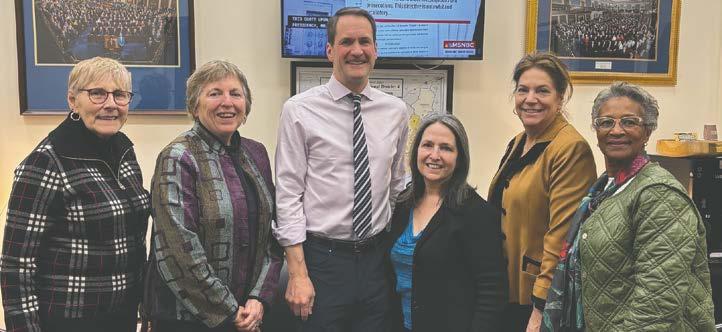

(continued from page 7)
where a former teacher filed a complaint regarding his own employment records.
Here, after the teacher had requested his employment records from the district, he indeed received them. Well, all but his evaluations. And that became the subject of the complaint.
The teacher had requested his “full personnel file” and argued that the employee evaluations not being included

was a violation of the FOI Act. But here, the law was not to be in his favor.
Under our state’s general education laws, “records of teacher performance and evaluation” are exempt from disclosure under the FOI Act (see CGS Section 10-151c). It is true that the same law states that a teacher may consent in writing to release of the records, but that is not the same as requiring disclosure under the FOI Act (it is not clear from the Commission’s decision whether the school district offered this route).
Unfortunately for the teacher, since such records are not required to be disclosed under the FOI Act, the Commission stated that it could not conclude that the district violated the FOI Act and also could not compel the
district to disclose the evaluations. For reference and further reading, the cases discussed in this article are Irwin v. Town of Suffield (FIC 20240084) and Green v. Windham Public Schools (FIC 2024-0099).
}Think about every problem, every challenge we face. The solution to each starts with education.Å
(continued from page 1)
The programs included a review of board of education roles and responsibilities, communication strategies, school finance, and leadership best practices.
• Individual Board Professional Development sessions, including roles and responsibilities, board self-evaluation, and goal setting.
• Development of a comprehensive Board Member Handbook, covering board roles and responsibilities, communication strategies, finance, policy development, and ethics.
• Five webinars on school finance
were delivered in collaboration with the Connecticut Association of School Business Officials (CASBO). Topics covered included budget development, adoption, and best practices for financial oversight. These webinars are archived on CABE’s website.
• Four webinars for board chairs, twelve monthly board chair virtual check-ins, and an in-person meeting at the Annual CABE/ CAPSS Convention. Topics covered included management of meetings, working with the district leadership team, and leading through difficult times.

• Board Chair Mentorship program. CABE contracted with former board leaders to create a cadre of 19 mentors to provide individualized leadership development, support sessions, and consultation to board chairs upon request. One board chair said, “My mentor’s counsel has been invaluable to me. He’s a great listener, asks smart questions, and offers useful insight and practical advice. I am so grateful CABE facilitates this program”.
In her recommendation for CABE’s application, Commissioner of Education Charlene Russell-Tucker said of CABE, “Their commitment to

empowering local boards of education through comprehensive professional development exemplifies their steadfast dedication to their mission to ‘assist local and regional boards of education in providing high quality public education for all Connecticut children through effective leadership.’”
“I am proud of the partnership with the CT Department of Education that provided the support to enhance the professional development we deliver to board members. CABE is now recognized at both the state and national level as the premier provider of services to board members,” said CABE Executive Director and General Counsel Patrice McCarthy



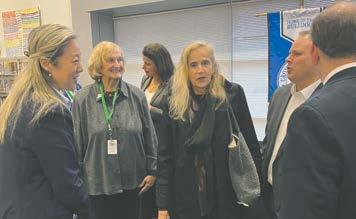

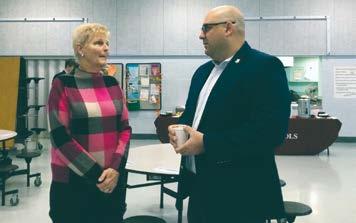



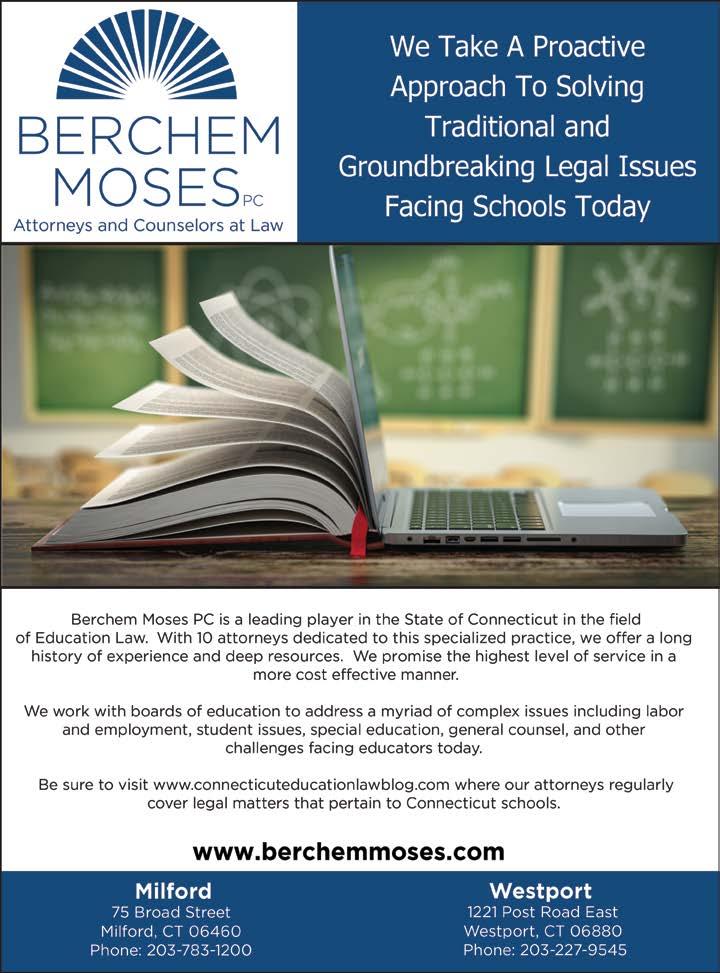

As those familiar with the Connecticut Freedom of Information Act (“FOIA”) know, under the law the vast majority of public-employee personnel related records are subject to disclosure upon request. Nowhere is this more evident than with respect to records concerning employee misconduct. The following is a refresher with respect to the application of the FOIA to employee misconduct complaints and records from employee investigations.
The general rule = disclosure of personnel records
The FOIA provides that a public agency need not disclose “personnel or medical files and similar files the disclosure of which would constitute an invasion of personal privacy.” In practice, this invasion of privacy exception is a tough burden to meet, as it precludes disclosure of such personnel-related files of public employees only when the information sought “does not pertain to legitimate matters of public concern and is highly offensive to a reasonable person.” Simply put, public employees’ expectations of privacy are diminished, as the public has a right to know “when their public employees are and are not performing their duties.” Perkins v. FOIC, 228 Conn. 158, 175 (1993). Accordingly, this invasion of privacy exception generally only protects truly private information (e.g., health-related information, Social Security numbers, bank account information, etc.).
What about complaints against school staff members?
As the FOIA’s “personnel files” exception has been narrowly construed, Connecticut’s Freedom of Information Commission (“FOIC”) and the courts have usually rejected attempts to shield records concerning complaints of employee misconduct. As such, disclosure is required of records of complaints filed against a public employee (including teachers), along with records of the resulting investigations and any disciplinary actions taken.
What about the accused (even if the accusations may not be true)?
As the public has a right to know of 1) the on-the job behaviors of its
employees and 2) the fairness and appropriateness (and overall handling) of investigations of workplace complaints, the FOIC has generally not recognized a privacy right for the accused even if the accused is eventually exonerated. The fact that the allegations were unsubstantiated does not defeat a request for records concerning an investigation.
What about the alleged victim?
The FOIC generally permits the redaction/withholding of the names of the alleged victim/complaining employee (especially with respect to a sexual harassment complaint), but it is not a guarantee.
What about witnesses?
Same answer (kind of). While the FOIC previously held in a case that the names of individuals who came forward and were interviewed regarding allegations of employee misconduct could be withheld or redacted (since the disclosure of the names of such individuals could have a chilling effect on the willingness to come forward to report such misconduct), there is no guarantee and efforts to withhold disclosure will likely be subject to review by the FOIC on a case-by-case basis.
What about student names in any personnel-related records?
While the personnel files exception may not fully protect employee privacy rights, separate exemptions under the FOIA for 1) student names and addresses, and 2) educational records (and “personally identifiable information” concerning students) protected from disclosure under the Family Educational Rights and Privacy Act (“FERPA”) will provide a basis to redact and withhold from disclosure portions of personnel and investigation records that would identify students (including any names of parents).
What about your notes?
The FOIA protects from disclosure “preliminary drafts or notes” where the public agency determines that “the public interest in withholding such documents clearly outweighs the public interest in disclosure.” As such, the FOIC has permitted the withholding of personal notes
that were taken by an investigator while conducting an investigation. The FOIC has stated that since there is an interest in an investigator taking notes in order to recall witness interviews/testimony and relevant details for any final investigative report, public agencies would understandably fear that investigators would be too circumspect in notetaking if they knew that their notes would eventually be disclosed, thus compromising the effectiveness of investigations. Please remember: This exception will not cover written witness statements or other “completed” documents; generally speaking, the distribution of notes to others destroys any attempt to assert that these notes are “preliminary” or a “draft” (or for merely personal use) subject to protection from disclosure.
The FOIC has long noted that promises of confidentiality to third persons do not create an exemption to disclosure.
Simply put, in the public sector, an absolute guarantee of confidentiality when investigating a complaint of employee wrongdoing cannot be made. With the exception of truly private information (e.g., intimate details or sexually explicit information revealed during an investigation, health-related information), one must assume that materials concerning complaints and reports are the public’s business and subject to disclosure. While it is possible that you may be able to protect the names of the alleged victims of employee misconduct, and even possible that you may be able to protect the names of witnesses/informants, there is no guarantee. In other words, do not make promises that you cannot necessarily keep to employees when investigating misconduct/complaints.
Attorney Sommaruga is the author of “Understanding Connecticut’s Freedom of Information Act” (6th Edition 2023).

